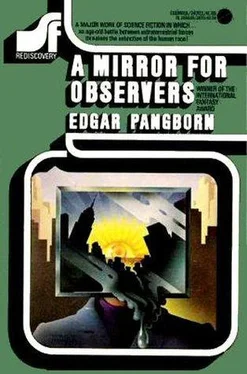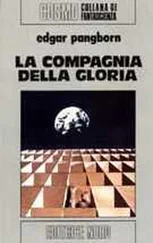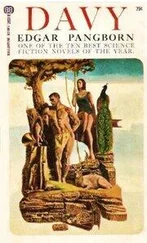“Plane travel,” I said. “Paris and London are only a few hours away….” Abraham brought me a drink. We couldn’t talk much, or read. He sat near me most of the evening in my dull little living room, which seemed to me more than ever like a well-upholstered cave in a jungle of the unknown; both of us haunted, understanding the panic in each other’s minds. Now and then we tried the radio again, but there was nothing except the usual loud confusion of trivialities. Toward bedtime Abraham telephoned Sharon. It was just a lovers’ conversation — “What’ve you been up to all evening?” — and since he didn’t mention the broadcast to her I assumed she hadn’t heard it. After hanging up he simply said: “I couldn’t….”
The three days since Sunday had allowed us to crawl back on a flimsy raft of hope. That man we found in the street — oh, it could have been pneumonia, a dozen other things. So we told each other then and for three days. Abraham had called an ambulance, which came quickly and whisked the fallen man away, after a few inquiries from an intern who seemed to have a worry in the back of his mind that wouldn’t come into words. Other similar cases? I almost asked the young doctor that, but held my tongue. As we drove home Abraham and I began passing each other counterfeit words. We knew they were counterfeit, but they bought us a little phony peace.
This morning the Times as usual had the best soberly factual account, offering statistics with a rather terrible restraint. There have been 50 hospitalized cases in the New York metropolitan area, and 16 deaths. In Chicago, 21 reported cases, 6 deaths. New Orleans, 13 and 3. Los Angeles, 10 and 3. This is the fourth day since Sunday, the sixth since Friday. The first reported case, according to the Times, was a Bronx housewife — Sunday morning. She died Monday afternoon.
The Times prints a statement from the A.M.A.: the disease “resembles an unusually virulent type of flu, with several atypical features. Nationwide medical resources are being mobilized to meet the unlikely event of an emergency, and there is no cause for alarm.” Close quote.
The Times goes on to describe the thing without quotation marks and apparently without pulling any punches. The first symptoms are merely those of the common cold — sniffles, moderate fever, general malaise. After a few hours of this, fever rises abruptly, there is deafness with violent head noises, perversion of the senses of smell and taste. Numbness of hands and feet, legs and forearms, followed quickly by more general motor paralysis, which in all cases so far has included paralysis of throat and tongue; patients cannot speak or swallow. Fever remains at a very high point for several hours — twelve in one case; it follows no pattern of fluctuation. Evidence of delirium in most cases, and the behavior of the speechless patients suggests vivid visual hallucinations before unconsciousness intervenes — as it does at the third or fourth hour after onset of major symptoms. Death, when it has occurred, has come during deep coma, after a gradual subsidence of fever, and may be due to paralysis of cardiac muscle. Cheyne-Stokes breathing very marked in all fatal cases so far. In “some” other patients the temperature, instead of dropping to deep subnormal, has leveled off at about 101°, the patients remaining unconscious but with some improvement of involuntary reflexes: prognosis obviously unknown. Except for the quote from the A.M A. the Times isn’t telling us there’s nothing to worry about. Nor do they speculate about origin and cause. Nor do they say directly that the arsenal of drugs and antibiotics has proved ineffective, but there is one small sentence difficult to forget: “Patients have responded to supportive treatment in some cases.” So it’s that bad. I suppose a newspaper reader would have to be somewhat familiar with medical argot, to grasp the implications. You couldn’t expect the Times to say: “They try to keep them comfortable, knowing nothing else to do.”
I have seen no follow-up account on the death of Daniel Walker. No mention anywhere, these three days, of Max or the Organic Unity Party. I commented on that this morning, wondering out loud if Max had gotten away with it. Abraham said: “No. He won’t.”
It is terrifying to see controlled and quiet anger in a face designed for gentleness. It was all the worse because of his physical slightness and soft voice. I waited for the look to go away. It did not. He had spread the paper on the table and stood looking down at it, but as if the black and white square were a window, as if there were immeasurable distances beyond. “What’s going on in your mind, Abraham?”
He only said: “They won’t get away with it.”
“You’re thinking of what Miriam said? Hodding in the pay of China and all that?”
“Hell, they won’t use that pipe dream, Will. I think that was spur-of-the-moment, and a poor effort. No, I think they’ll hope for silence, hope that nobody can make the connection. And nobody could, unless one of us talks — I mean one of those who were up there on the roof garden. I don’t think Fry or Senator Galt understood anything of it — they’re freaks, nobodies. Nicholas, Max, Miriam — and Bill, and me — those five may be the only ones who know.”
“Should you speak, Abraham?”
He was all grownup when he said, with no tension in his voice, without even looking at me: “I haven’t quite decided….”
We went for a walk that afternoon. No objective, simply here and there in the streets, a bus uptown, west on 125th, back downtown through the West Side, walking. We saw no one collapsing in the street. Perhaps things were rather too quiet for a weekday afternoon. There wasn’t quite the normal amount of talk and laughter in those who passed us. We heard the bell and siren of ambulances five or six times in our aimless journey — but one does anyhow: illness and accident have always claimed their victims through the nights and days of any city….
Hodding is dead. We got that from the evening paper.
His house and laboratory in a Long Island suburb caught fire from “an explosion of unknown origin.” His body and those of his wife, daughter-in-law, and grandson, aged nine, have been identified. The four were in the laboratory when the explosion occurred. The laboratory, says the paper, was a private enterprise which Dr. Hodding had carried on after his retirement from the Wales Foundation. Dr. Hodding’s son had been away from the house; the paper quotes him as saying that the laboratory was designed for some limited type of biological research, hardly more than a retired man’s hobby. Young Hodding is an architect, and claims he knew nothing about his father’s line of work; but he is certain that nothing was ever kept in the laboratory that could have caused an explosion. Police, says the paper, are investigating the possibility that a bomb may have been set by a crank. “One,” said Abraham. “One who can’t talk any more. If Fry and Galt are insured, the companies ought to be worrying a bit.” And then, pursuing another line of thought: “Will, such a thing could be no use to anyone as a weapon, unless there were a means of immunizing the users. I keep coming back to that. I think Max wanted to dictate terms to the world, including Asia. I think he hates the Federalists worse than others because he sees himself as — oh, the first President of a world government, something like that. He’d feel it was quite all right to kill off a few million commonplace human animals if that would make him Leader — for the world’s good of course, always for the world’s good. But first he would have to have a means of immunizing the faithful.”
“Perhaps Hodding was working on that, and got only halfway. He developed the disease but not the protection.”
Читать дальше












